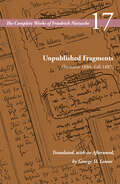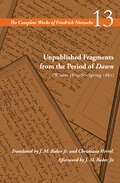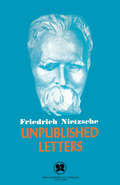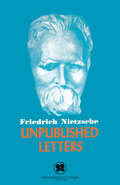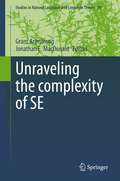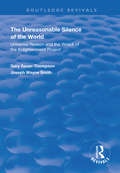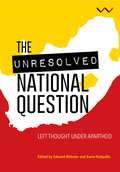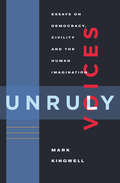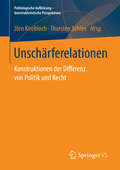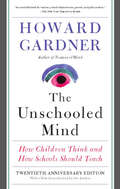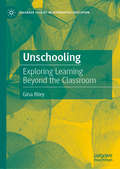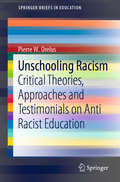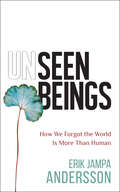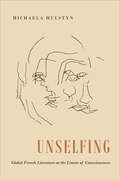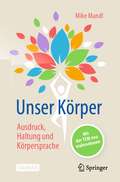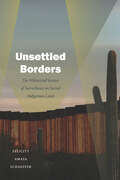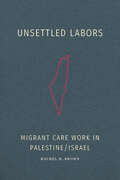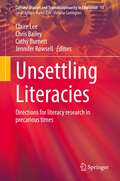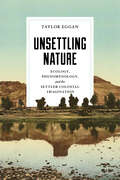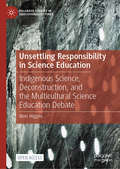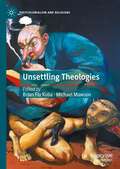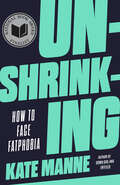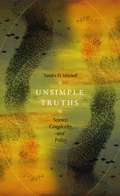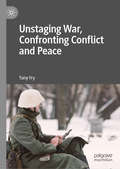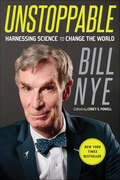- Table View
- List View
Unpublished Fragments: Volume 17 (The Complete Works of Friedrich Nietzsche)
by Friedrich NietzscheThe Complete Works of Friedrich Nietzsche will publish in its entirety, for the first time, an English translation of the full contents of the Kritische Studienausgabe. This volume of the Complete Works provides the first English translation of Nietzsche's unpublished notes from Summer 1886 through Fall 1887. In these writings we find drafts of new prefaces for the second editions of his earlier works, notes for the soon-to-appear On the Genealogy of Morality, and crucially, fragments and plans for an anticipated "master work" under the title "The Will to Power." This projected work, as is now well-known, was never written by Nietzsche; instead, it was fraudulently assembled by his sister Elisabeth Förster-Nietzsche and his friend Heinrich Köselitz (aka Peter Gast) and published under Nietzsche's name after his death. Only now, with the publication of this volume and the ones that precede and follow it, are English readers able to examine for themselves the full set of unpublished writings of the last creative period of Nietzsche's life. Taking into account the latest editorial work on his final notebooks, and including a detailed account by Mazzino Montinari of Nietzsche's decision not to complete a "master work," this volume documents the evolution of Nietzsche's thinking on such important themes as nihilism, eternal recurrence, and the revaluation of all values as it presents his late Nachlass free from the distortions perpetrated against it over a century ago.
Unpublished Fragments from the Period of Dawn: Volume 13 (The Complete Works of Friedrich Nietzsche)
by Friedrich NietzscheThis volume provides the first English translation of Nietzsche's unpublished notes from late 1879 to early 1881, the period in which he authored Dawn, the second book in the trilogy that began with Human, All Too Human and concluded with The Joyful Science. In these fragments, we see Nietzsche developing the conceptual triad of morals, customs, and ethics, which undergirds his critique of morality as the reification into law or dogma of conceptions of good and evil. Here, Nietzsche assesses Christianity's role in the determination of moral values as the highest values and of redemption as the representation of humanity's highest aspirations. These notes show the resulting tension between Nietzsche's contrasting thoughts on modernity, which he critiques as an unrecognized aftereffect of the Christian worldview, but also views as the springboard to "the dawn" of a transformed humanity and culture. The fragments further allow readers insight into Nietzsche's continuous internal debate with exemplary figures in his own life and culture—Napoleon, Schopenhauer, and Wagner—who represented challenges to hitherto existing morals and culture—challenges that remained exemplary for Nietzsche precisely in their failure. Presented in Nietzsche's aphoristic style, Dawn is a book that must be read between the lines, and these fragments are an essential aid to students and scholars seeking to probe this work and its partners.
Unpublished Letters
by Friedrich NietzscheDiscover the compelling private world of the most infamous philosopher of the nineteenth century in Unpublished Letters. Comprised of correspondence between Nietzsche's inner circle--including several titillating letters to his sister--Unpublished Letters gives readers a never-before-seen look into the philosopher's daily life.
Unpublished Letters
by Friedrich NietzscheThis collection of personal correspondence provides a rare window into the private life of the toweringnineteenth-century philosopher.Friedrich Nietzsche was the most iconoclastic philosopher of modern history. He is known to the world as the scathingly brilliant provocateur behind such foundational works as Thus Spoke Zarathustra, Beyond Good and Evil, and Twilight of the Idols. This was Nietzsche as he addressed himself to the public. But in this collection of his personal letters, we discover a very different man: Nietzsche the devoted son; the caring friend; the university student; the shy and distant lover. Comprised of correspondence between Nietzsche&’s inner circle—including several revelatory letters to his sister—Unpublished Letters gives readers a never-before-seen look into the philosopher&’s daily life.
Unraveling the complexity of SE (Studies in Natural Language and Linguistic Theory #99)
by Grant Armstrong Jonathan E. MacDonaldThis book makes a novel contribution to our understanding of Romance SE constructions by combining both diachronic and synchronic theoretical perspectives along with a range of empirical data from different languages and dialects. The collection, divided into four sections, proposes that SE constructions may be divided into one class that is the result of grammaticalization of a reflexive pronoun up the syntactic tree, from Voice and above, and another class that has resulted from the reanalysis of reflexive and anticausative morphemes as an argument expletive or verbal morpheme generated in positions from Voice and below. The contributions, while varied in both empirical content and theoretical approach, all serve to highlight different aspects of the overarching idea that SE constructions have evolved from these two distinct grammaticalization paths. The book appeals to researchers and academics in the field and closes with a unified approach to various SE constructions that makes important use of its status as a verbal morpheme. In addition to aligning a novel string of empirical contributions under a new theoretical umbrella, a clear research direction emerges from this volume based on the morphosyntactic nature of SE itself: Is it a clitic, an agreement morpheme, or a verbal morpheme?
The Unreasonable Silence of the World: Universal Reason and the Wreck of the Enlightenment Project (Routledge Revivals)
by Gary Sauer-Thompson Joseph Wayne SmithPublished in 1997. This book develops a postmodernist critique of philosophy - although not the postmodernism of literary philosophers such as Derrida. This postmodernism is one of ecological limitationism coupled with a practical common sense ’realism’. The authors affirm the reality of life-world and the primacy of practice against materialists, physicalists and reductionists. They attempt to show that orthodox Anglo-American analytic philosophy is not merely incapable of completing its own quest to supply a regionally justified system of reality, but, more importantly, it fails as well to meet the challenges of the age.
The Unresolved National Question in South Africa: Left thought under apartheid and beyond
by Edward Webster & Karin PampallisThis volume examines the way in which various strands of left thought have addressed the National Question. The re-emergence of debates on the decolonisation of knowledge has revived interest in the National Question, which began over a century ago and remains unresolved. Tensions that were suppressed and hidden in the past are now being openly debated. Despite this, the goal of one united nation living prosperously under a constitutional democracy remains elusive. This edited volume examines the way in which various strands of left thought have addressed the National Question, especially during the apartheid years, and goes on to discuss its relevance for South Africa today and in the future. Instead of imposing a particular understanding of the National Question, the editors identified a number of political traditions and allowed contributors the freedom to define the question as they believed appropriate - in other words, to explain what they thought was the Unresolved National Question. This has resulted in a rich tapestry of interweaving perceptions. The volume is structured in two parts. The first examines four foundational traditions: Marxism-Leninism (the Colonialism of a Special Type thesis); the Congress tradition; the Trotskyist tradition; and Africanism. The second part explores the various shifts in the debate from the 1960s onwards, and includes chapters on Afrikaner nationalism, ethnic issues, black consciousness, feminism, workerism and constitutionalism. The editors hope that by revisiting the debates not popularly known among the scholarly mainstream, this volume will become a catalyst for an enriched debate on our identity and our future.
Unruly Voices
by Mark Kingwell"Mark Kingwell is a beautiful writer, a lucid thinker and a patient teacher ... His insights are intellectual anchors in a fast-changing world."-Naomi Klein, author of No LogoMeet the "fast zombie" citizen of the current world. He is a rapid, brainless carrier of preference-driven consumption. His Facebook-style 'likes' replace complex notions of personhood. Legacy college admissions and status-seekers gobble up his idea of public education, and positional market reductions hollow out his sense of shared goods. Meanwhile, the political debates of his 24-hour-a-day newscycle are picked clean by pundits, tortured by tweets. Forget the TV shows and doomsday scenarios; when it comes to democracy, the zombie apocalypse may already be here.Since the publication of A Civil Tongue (1995), philosopher Mark Kingwell has been urging us to consider how monstrous, self-serving public behaviour can make it harder to imagine and achieve the society we want. Now, with Unruly Voices, Kingwell returns to the subjects of democracy, civility, and political action, in an attempt to revitalize an intellectual culture too-often deadened by its assumptions of personal advantage and economic value. These 17 new essays, where zombies share pages with cultural theorists, poets, and presidents, together argue for a return to the imagination-and from their own unruly voices rises a sympathetic democracy to counter the strangeness of the postmodern political landscape.Mark Kingwell is the author of sixteen books and a contributing editor for Harper's Magazine.
Unschärferelationen: Konstruktionen der Differenz von Politik und Recht (Politologische Aufklärung – konstruktivistische Perspektiven)
by Thorsten Schlee Jörn KnoblochDas prekäre Verhältnis von Politik und Recht ist ein beständiges Thema der Politikwissenschaft und öffentlicher demokratischer Diskurse. Die in diesem Band versammelten Beiträge fokussieren das umstrittene Verhältnis von Politik und Recht in Auseinandersetzung mit konstruktivistischen Theorien der Politik. Sie weisen das Verhältnis zweier Semantiken und die ihm zugeschriebenen Kausalitätsbeziehungen in der Zusammenschau als Unschärferelationen aus. Der Band identifiziert die Unschärfen des Zusammenspiels von Politik und Recht in Fragen der Gründung von Demokratie und Verfassung, in den Diskursen um die Politisierung der Verfassungsgerichtsbarkeit wie umgekehrt der Verrechtlichung des Politischen und nicht zuletzt in Kontexten der Produktion internationaler Normen wie auch der Kollision internationaler Rechtsregime.
The Unschooled Mind: How Children Think and How Schools Should Teach
by Howard GardnerMerging cognitive science with educational agenda, Gardner makes an eloquent case for restructuring our schools by showing just how ill-suited our minds and natural patterns of learning are to the prevailing modes of education. This reissue includes a new introduction by the author.
Unschooling: Exploring Learning Beyond the Classroom (Palgrave Studies in Alternative Education)
by Gina RileyThis book explores the history of the unschooling movement and the forces shaping the trajectory of the movement in current times. As an increasing number of families choose to unschool, it becomes important to further study this philosophical and educational movement. It is also essential to ascribe theory to the movement, to gain greater understanding of its workings as well as to increase the legitimacy of unschooling itself. In this book, Riley provides a useful overview of the unschooling movement, grounding her study in the choices and challenges facing families as they consider different paths towards educating their children outside of traditional school systems.
Unschooling Racism: Critical Theories, Approaches and Testimonials on Anti Racist Education (SpringerBriefs in Education)
by Pierre W. OrelusThis book draws on critical race theories and teachers’ testimonials grounded in 20 years of teaching experiences to reveal the ways in which racial and cultural biases are embedded in school curricula, and both their intended and unintended consequences on the learning and well being of students of color. More specifically, this book examines how these biases have played a significant role in the mis-education, misrepresentation, and marginalization of African American, Native American, Latino and Asian students. But the analysis doesn’t stop there. The author goes beyond the school walls to underscore how systemic racism, paired with colonialism, has impacted the lives of racially marginalized groups in both the United States and developing countries. This book uncovers these injustices and proposes alternative ways in which racism can be unschooled.
Unseen Beings: How We Forgot the World Is More Than Human
by Erik Jampa Andersson'Unseen Beings is a magnificent, passionate, brilliantly written manifesto for our urgent reimagining of our relationship with every aspect of the creation… indispensable reading for anyone who longs for a just and balanced human future. Buy it and give it to everyone you know.' Andrew Harvey, author of The Hope A revolutionary perspective on the climate catastrophe bridging history, philosophy, science, and religion.You&’ve heard the hard-hitting data and you&’ve seen the documentaries. But what will it truly take for humanity to change? We will not tackle the climate catastrophe with data alone – we need new stories and new ways of seeing and thinking.By drawing on traditional eco-philosophies and Buddhist wisdom, Erik Jampa Andersson offers an approach to our environmental emergency that will make us rethink the very nature of our existence on this incredible planet. Looking at the climate catastrophe through the framework of disease, Unseen Beings examines our ecological diagnosis, its historical causes and conditions and, crucially, its much-needed treatment, as well as exploring:how and why we constructed a human-centric worldview amazing recent discoveries around non-human intelligencehow religious traditions have dealt with questions of nature, sentience and ecologycritical connections between human health and environmental healthThis book is a call to action. Climate anxiety has left many of us feeling confused and powerless, but there is another way. If we can recover our natural sense of enchantment and kinship with non-human beings, we may still find a path to build a better future.
Unselfing: Global French Literature at the Limits of Consciousness (University of Toronto Romance Series)
by Michaela HulstynAltered states of consciousness – including experiences of deprivation, pain, hallucination, fear, desire, alienation, and spiritual transcendence – can transform the ordinary experience of selfhood. Unselfing explores the nature of disruptive self-experiences and the different shapes they have taken in literary writing. The book focuses on the tension between rival conceptions of unselfing as either a form of productive self-transcendence or a form of alienating self-loss. Michaela Hulstyn explores the shapes and meanings of unselfing through the framework of the global French literary world, encompassing texts by modernist figures in France and Belgium alongside writers from Algeria, Rwanda, and Morocco. Together these diverse texts prompt a re-evaluation of the consequences of the loss or the transcendence of the self. Through a series of close readings, Hulstyn offers a new account of the ethical questions raised by altered states and shows how philosophies of empathy can be tested against and often challenged by literary works. Drawing on cognitive science and phenomenology, Unselfing provides a new methodology for approaching texts that give shape to the fringes of conscious experience.
Unser Körper - Ausdruck, Haltung, Körpersprache: Mit der TCM neu wahrnehmen
by Mike MandlWer sind wir in körperlicher Hinsicht? Was sagt unser Erscheinungsbild über uns? Und was hat das alles mit chinesischer Medizin zu tun? Um diese Fragen zu beantworten, müssen wir uns nur betrachten. Unser Körper spricht zu uns. Durch seine Formen, seine Strukturen, seine Ausprägung. Er erzählt uns spannende und lehrreiche Geschichten: Über unsere Herkunft und unseren Werdegang. Über unseren Status Quo und unsere Zukunft. Er berichtet von Möglichkeiten und Grenzen, von Stärken und Schwächen, von Vorlieben und Abneigungen. Er kann uns helfen, uns selber besser kennen zu lernen. Vorausgesetzt: Wir verstehen seine Sprache. Die Sprache unseres Körpers zu erlernen, ist das Ziel dieses Buches. Der Autor vergleicht dabei Menschen mit Bäumen, spricht von Fünf Elementen, widmet sich den drei Schätzen und ist der Meinung, dass Kondition und Konstitution auf einen Nenner kommen sollen. Das wirkt auf den ersten Blick chinesisch, im zweiten Blick ist es sogar, weil eine Grundlage dieses Buches die Traditionelle Chinesische Medizin ist. Das alles wird serviert mit Leichtigkeit und einer Prise Humor: Geschichten von Kopf bis Fuß.
Unsettled Borders: The Militarized Science of Surveillance on Sacred Indigenous Land (Dissident Acts)
by Felicity Amaya SchaefferIn Unsettled Borders Felicity Amaya Schaeffer examines the ongoing settler colonial war over the US-Mexico border from the perspective of Apache, Tohono O’odham, and Maya who fight to protect their sacred land. Schaeffer traces the scientific and technological development of militarized border surveillance across time and space from Spanish colonial lookout points in Arizona and Mexico to the Indian wars, when the US cavalry hired Native scouts to track Apache fleeing into Mexico, to the occupation of the Tohono O’odham reservation and the recent launch of robotic bee swarms. Labeled “Optics Valley,” Arizona builds on a global history of violent dispossession and containment of Native peoples and migrants by branding itself as a profitable hub for surveillance. Schaeffer reverses the logic of borders by turning to Indigenous sacredsciences: ancestral land-based practices that are critical to reversing the ecological and social violence of surveillance, extraction, and occupation.
Unsettled Labors: Migrant Care Work in Palestine/Israel
by Rachel H. BrownIn Unsettled Labors, Rachel H. Brown explores the overlooked labor of migrant workers in Israel’s eldercare industry. Brown argues that live-in eldercare in Palestine/Israel, which is primarily done by migrant workers, is an often invisible area where settler colonialism is reproduced culturally, economically, and biologically. Situating Israeli labor markets within a longer history of imperialism and dispossession of Palestinian land, Brown positions migrant eldercare within the resulting tangle of Israeli laws, policies, and social discourses. She draws from interviews with caretakers, public statements, court documents, and first-hand fieldwork to uncover the inherently contradictory nature of elder care work: the intimate presence of South and Southeast Asian workers in the home unsettles the idea of the Israeli home as an exclusively Jewish space. By paying close attention to the comparative racialization of migrant workers, Palestinians, asylum seekers, and Mizrahi and Ashkenazi settlers, Brown raises important questions of labor, social reproduction, displacement, and citizenship told through the stories of collective care provided by migrant workers in a settler colonial state.
Unsettling Literacies: Directions for literacy research in precarious times (Cultural Studies and Transdisciplinarity in Education #15)
by Claire Lee Chris Bailey Cathy Burnett Jennifer RowsellThis book asks researchers what uncertainty means for literacy research, and for how literacy plays through uncertain lives. While the book is not focused only on COVID-19, it is significant that it was written in 2020-2021, when our authors’ and readers’ working and personal lives were thrown into disarray by stay-at-home orders. The book opens up new spaces for examining ways that literacy has come to matter in the world.Drawing on the reflections of international literacy researchers and important new voices, this book presents re-imagined methods and theoretical imperatives. These difficult times have surfaced new communicative practices and opened out spaces for exploration and activism, prompting re-examination of relationships between research, literacy and social justice. The book considers varied and consequential events to explore new ways to think and research literacy and to unsettle what we know and accept as fundamental to literacy research, opening ourselves up for change. It provides direction to the field of literacy studies as pressing global concerns are prompting literacy researchers to re-examine what and how they research in times of precarity.
Unsettling Nature: Ecology, Phenomenology, and the Settler Colonial Imagination (Under the Sign of Nature)
by Taylor EgganThe German poet and mystic Novalis once identified philosophy as a form of homesickness. More than two centuries later, as modernity’s displacements continue to intensify, we feel Novalis’s homesickness more than ever. Yet nowhere has a longing for home flourished more than in contemporary environmental thinking, and particularly in eco-phenomenology. If only we can reestablish our sense of material enmeshment in nature, so the logic goes, we might reverse the degradation we humans have wrought—and in saving the earth we can once again dwell in the nearness of our own being. Unsettling Nature opens with a meditation on the trouble with such ecological homecoming narratives, which bear a close resemblance to narratives of settler colonial homemaking. Taylor Eggan demonstrates that the Heideggerian strain of eco-phenomenology—along with its well-trod categories of home, dwelling, and world—produces uncanny effects in settler colonial contexts. He reads instances of nature’s defamiliarization not merely as psychological phenomena but also as symptoms of the repressed consciousness of coloniality. The book at once critiques Heidegger’s phenomenology and brings it forward through chapters on Willa Cather, D. H. Lawrence, Olive Schreiner, Doris Lessing, and J. M. Coetzee. Suggesting that alienation may in fact be "natural" to the human condition and hence something worth embracing instead of repressing, Unsettling Nature concludes with a speculative proposal to transform eco-phenomenology into "exo-phenomenology"—an experiential mode that engages deeply with the alterity of others and with the self as its own Other.
Unsettling Responsibility in Science Education: Indigenous Science, Deconstruction, and the Multicultural Science Education Debate (Palgrave Studies in Educational Futures)
by Marc HigginsThis open access book engages with the response-ability of science education to Indigenous ways-of-living-with-Nature. Higgins deconstructs the ways in which the structures of science education—its concepts, categories, policies, and practices—contribute to the exclusion (or problematic inclusion) of Indigenous science while also shaping its ability respond. Herein, he undertakes an unsettling homework to address the ways in which settler colonial logics linger and lurk within sedimented and stratified knowledge-practices, turning the gaze back onto science education. This homework critically inhabits culture, theory, ontology, and history as they relate to the multicultural science education debate, a central curricular location that acts as both a potential entry point and problematic gatekeeping device, in order to (re)open the space of responsiveness towards Indigenous ways-of-knowing-in-being.
Unsettling Theologies: Memory, Identity, and Place (Postcolonialism and Religions)
by Brian Fiu Kolia Michael MawsonHow can we understand and respond to past and present entanglements of Christianity with colonisation? What kinds of theological perspectives and approaches are needed in the wake of colonisation and its impact? Unsettling Theologies includes responses to these questions from Aboriginal, Māori, Pasifika and White scholars.
Unshrinking: How to Face Fatphobia
by Kate ManneNATIONAL BOOK AWARD FINALIST • The definitive takedown of fatphobia, drawing on personal experience as well as rigorous research to expose how size discrimination harms everyone, and how to combat it—from the acclaimed author of Down Girl and Entitled&“An elegant, fierce, and profound argument for fighting fat oppression in ourselves, our communities, and our culture.&”—Roxane Gay, author of HungerFor as long as she can remember, Kate Manne has wanted to be smaller. She can tell you what she weighed on any significant occasion: her wedding day, the day she became a professor, the day her daughter was born. She&’s been bullied and belittled for her size, leading to extreme dieting. As a feminist philosopher, she wanted to believe that she was exempt from the cultural gaslighting that compels so many of us to ignore our hunger. But she was not.Blending intimate stories with the trenchant analysis that has become her signature, Manne shows why fatphobia has become a vital social justice issue. Over the last several decades, implicit bias has waned in every category, from race to sexual orientation, except one: body size. Manne examines how anti-fatness operates—how it leads us to make devastating assumptions about a person&’s attractiveness, fortitude, and intellect, and how it intersects with other systems of oppression. Fatphobia is responsible for wage gaps, medical neglect, and poor educational outcomes; it is a straitjacket, restricting our freedom, our movement, our potential.In this urgent call to action, Manne proposes a new politics of &“body reflexivity&”—a radical reevaluation of who our bodies exist in the world for: ourselves and no one else. When it comes to fatphobia, the solution is not to love our bodies more. Instead, we must dismantle the forces that control and constrain us, and remake the world to accommodate people of every size.
Unsimple Truths: Science, Complexity, and Policy
by Sandra D. MitchellThe world is complex, but acknowledging its complexity requires an appreciation for the many roles context plays in shaping natural phenomena. In Unsimple Truths,Sandra Mitchell argues that the long-standing scientific and philosophical deference to reductive explanations founded on simple universal laws, linear causal models, and predict-and-act strategies fails to accommodate the kinds of knowledge that many contemporary sciences are providing about the world. She advocates, instead, for a new understanding that represents the rich, variegated, interdependent fabric of many levels and kinds of explanation that are integrated with one another to ground effective prediction and action. Mitchell draws from diverse fields including psychiatry, social insect biology, and studies of climate change to defend "integrative pluralism"---a theory of scientific practices that makes sense of how many natural and social sciences represent the multi-level, multi-component, dynamic structures they study. She explains how we must, in light of the now-acknowledged complexity and contingency of biological and social systems, revise how we conceptualize the world, how we investigate the world, and how we act in the world. Ultimately Unsimple Truths argues that the very idea of what should count as legitimate science itself should change.
Unstaging War, Confronting Conflict and Peace
by Tony FryThis book presents the concept of ‘unstaging’ war as a strategic response to the failure of the discourse and institutions of peace. This failure is explained by exploring the changing character of conflict in current and emergent global circumstances, such as asymmetrical conflicts, insurgencies, and terrorism. Fry argues that this pluralisation of war has broken the binary relation between war and peace: conflict is no longer self-evident, and consequentially the changes in the conditions, nature, systems, philosophies and technologies of war must be addressed. Through a deep understanding of contemporary war, Fry explains why peace fails as both idea and process, before presenting ‘Unstaging War’ as a concept and nascent practice that acknowledges conflict as structurally present, and so is not able to be dealt with by attempts to create peace. Against a backdrop of increasingly tense relations between global power blocs, the beginnings of a new nuclear arms race, and the ever-increasing human and environmental impacts of climate change, a more viable alternative to war is urgently needed. Unstaging War is not claimed as a solution, but rather as an exploration of critical problems and an opening into the means of engaging with them.
Unstoppable: Harnessing Science to Change the World
by Bill Nye“Climate change is coming. What can we do about it? TV’s ‘Science Guy’ has some answers. . . . An important message delivered in a winning manner.” —Kirkus ReviewsJust as World War II called an earlier generation to greatness, so the climate crisis is calling today’s rising youth to action: to create a better future.In Unstoppable, Bill Nye expands the message for which he is best known and beloved. That message is that with a combination of optimism and scientific curiosity, obstacles become opportunities, and the possibilities of our world become limitless. With a scientist’s thirst for knowledge and an engineer’s vision of what can be, Bill Nye sees today’s environmental issues not as insurmountable problems but as chances for our society to rise to the challenge and create a cleaner, healthier, smarter world. We need not accept that transportation consumes half our energy, and that two-thirds of the energy you put into your car is immediately thrown away out the tailpipe. We need not accept that dangerous emissions are the price we must pay for a vibrant economy and a comfortable life. Above all, we need not accept that we will leave our children a planet that is dirty, overheated, and depleted of resources. As Bill shares his vision, he debunks some of the most persistent myths and misunderstandings about global warming. When you are done reading, you’ll be enlightened and empowered. Chances are, you’ll be smiling, too, ready to join Bill and change the world.
